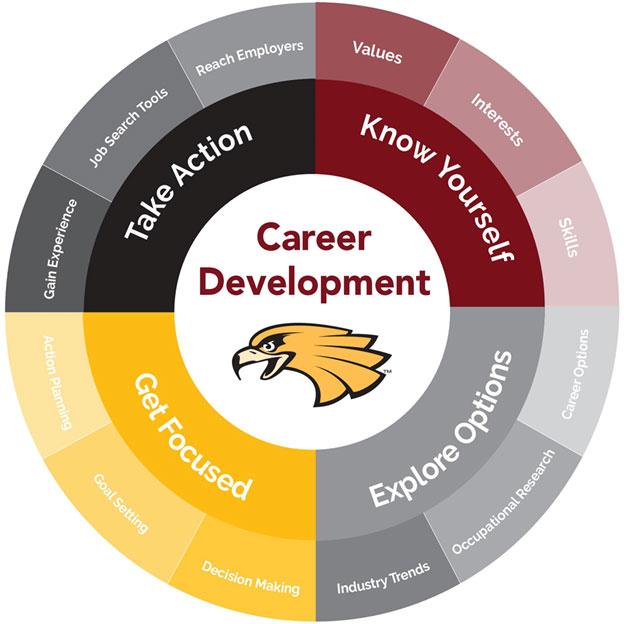
Four Stages of the Career Process

Stage 1 - Know Yourself
Values
Who you are, what you hold dear, what upsets you, and what underlies your decisions, are all connected to your personal values. Your values reflect what is important to you. They are a shorthand way of describing your motivations. Take a few minutes to complete these Values Assessments to gain a better understanding of your own personal values.
Interests
Understanding your interests can help you match yourself with different careers. Everyone has a different way to describe themselves and what they like to do. These surveys let you rate activities you enjoy, your personal qualities, and school subjects you like. Take a few minutes to complete one or more of these assessments to help you find out what your interests are and how they relate to the world of work.
Skills
Your skills describe what you like to do and what you are good at. You develop skills by training and experience that improve your ability to do tasks. Being able to identify and describe your skills allows you to answer key questions at job interviews such as, “What can you do for my organization?” And, “What problems can you solve?” In the workplace, there are two kinds of skills: technical skills, and soft skills. Both types are essential for success. Take a few minutes to complete this assessment to help you identify your skills and find the kinds of work they relate to.
Stage 2 – Explore Your Options
Career Options
Whether you’re exploring majors or searching for information about your chosen field, this website will help you connect majors to careers. Learn about typical career areas and types of employers that hire people with each major, as well as strategies to make you a more marketable candidate. Continue your research through the websites provided.
Occupational Research
The Occupational Outlook Handbook (OOH) provides information on what workers do; the work environment; education, training, and other qualifications; pay; the job outlook; information on state and area data; similar occupations; and sources of additional information, for 329 occupational profiles covering about 83 percent of the jobs in the economy.
Industry Research
Discover which industries are in demand, have the largest employment, are experiencing declining employment, pay the most, and more. Sharpen your job search or career planning by learning where industry growth and decline are occurring.
Stage 3 – Get Focused
Decision Making
Making career decisions is a lifelong process. It is all about exploring and experiencing the world of work. It is also about understanding abilities, interests, skills, and values and combining these to create a meaningful framework for life. Utilize these resources to help you along with the decision making process.
- Career Decision-Making Difficulties Questionnaire
- Career Assessment- Need some ideas for Careers you might like?
Goal Setting
Do you spend more time planning your vacations than your career? What's more important to you? Defining your career goals will help you make necessary steps toward a satisfying work life. Use this resource to help you create, adapt, and implement a successful Career Plan.
Action Planning
Just as it says -> Take action on your goals! And make decisions!
Stage 4 – Take Action
Gain Experience
Internships!
Research from the National Association of Colleges and Employers (NACE) proves that students with internship experience are significantly more likely to get hired after college than peers lacking internship experience. NACE’s research also shows that students with internship experience tend to have much higher starting salaries than students without such experience. Need I say more?
If you need any more reason, here are the “Top 10 Reasons Why You Should Get Internship Experience in College”:
- Internships demonstrate Initiative.
- Internships help you learn more about yourself.
- Internships enhance your resume.
- Internships help you sell yourself in interviews.
- Internships increase your professional confidence.
- Internships improve your communication skills.
- Internships help you prove yourself in the “real-world.”
- Internships expand your professional network.
- Internships help you collect professional references.
- Internships help you develop better work habits.
Job Search Tools
The internet is a top resource for many of today’s job hunters. Among Americans who have looked for work in the last two years, (as of 2015), 79% utilized online resources in their most recent job search and 34% say these online resources were the most important tool available to them
- Handshake
- Networking
- Indeed
- Glassdoor
- And many more!
Research Employers
Research is a critical part of the job search process. It can help you: Identify companies that may be hiring in your field; Prepare you for a job interview; Learn about potential growth of businesses and industries; Focus your job search on employers that share your values; Understand how you can apply your skills in a new field.
- Informational Interviews – Change things around and reverse the roles of the interview. Find a company of interest, locate a professional within that company, then ask to interview that individual to gain a better understanding of the company, its environment, and what it takes to work there.
- Company Specific Websites – Conduct research on a company of interest. Find the company website online and look around. Investigate the company’s goals & initiatives, and see if it is a good fit for your personality, interests & goals.